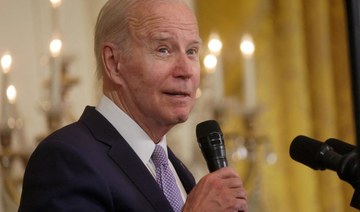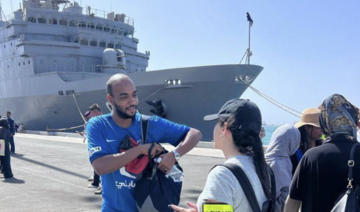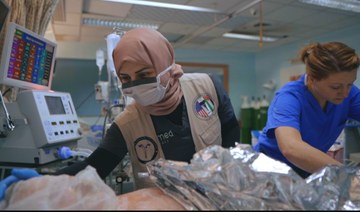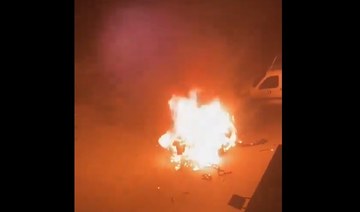CAIRO: Heavy shelling in the Sudanese capital of Khartoum on Thursday disrupted efforts to deliver badly needed aid to trapped civilians, after yet another fragile and frequently violated truce ran out, residents said.
Sudan has plunged into chaos since fighting erupted in mid-April between the country’s two rival top generals. There is increasing concern for those trapped and displaced by the fighting, and aid workers and civilians have said there’s a dire lack of basic services, medical care, food and water.
In central areas of Khartoum, sporadic explosions could be heard Thursday, a day after the United Nations warned that the Sudanese people are “facing a humanitarian catastrophe,” and after the latest in a series of cease-fires expired earlier in the day.
“The situation is very dire,” said Atiya Abdalla Atiya, who leads a key doctors union. “All forms of shelling can still be heard in Khartoum, whether air or artillery shelling.”
Black plumes of smoke rising from downtown neighborhoods dotted Khartoum’s skyline at midday. The fighting also raised questions about the viability of internationally backed initiatives seeking to bring an end to the violence that upended the African country’s transition to democracy.
The conflict started on April 15, preceded by months of escalating tensions between the military, led by Gen. Abdel-Fattah Burhan, and a rival paramilitary group called the Rapid Support Forces, or RSF, commanded by Gen. Mohamed Hamdan Dagalo.
The fighting turned urban areas into battlefields and foreign governments rushed to evacuate their diplomats and thousands of foreign nationals out of Sudan.
Both sides have traded accusations of truce violations over the past weeks. On Thursday, each side claimed its forces were the subject of attacks. The military said late Wednesday it clashed with RSF forces around key government institutions in Khartoum, including the Republican Palace in the capital’s center.
Cease-fire initiatives by the United States, Saudi Arabia and the East African bloc known as IGAD have all floated a path toward longer negotiations. But the warring sides have shown little commitment to even short-term promises to stop the fighting.
The doctors’ group has in recent days warned that at least 60 percent, of hospitals located near areas of active fighting are out of service, either because they have been shelled or due to the shortage of medical personnel and supplies.
Among those in a critical, life-threatening situation are some 12,000 patients with kidney failure with no access to dialysis facilities. “People suffering from chronic diseases are dying at home because functioning hospitals are only attending to the wounded,” said Atiya, of the Sudanese Doctors’ Syndicate.
The head of the UN children’s agency, Catherine Russell, said from Kenya on Thursday that “Sudan is teetering toward catastrophe” and warned that children are increasingly caught in the crossfire.
“While we are unable to confirm estimates due to the intensity of the violence, UNICEF has received reports that 190 children have been killed and another 1,700 injured in Sudan since conflict erupted almost three weeks ago,” she said.
“For the sake of Sudan’s children, the violence must stop,” Russell added.
Kuwait’s government announced Thursday that it will be dispatching flights carrying medical and humanitarian supplies to the city of Port Sudan, on Sudan’s Red Sea coast, the Gulf Arab country’s state-run news agency KUNA said. Sudan’s state news agency reported that the first Kuwaiti plane carrying medical supplies and food aid arrived on Thursday afternoon.
The flights are meant to deliver at least 75 tons of humanitarian assistance to the Sudanese heath authorities and the Sudanese Red Crescent.
However, the lawlessness brought on by the violence has also thwarted aid distribution across Sudan, with looting and attacks on aid and medical facilities posing major setbacks.
A coordinator for the UN’s refugee agency in the Darfur region, Toby Howard, said the organization’s facilities in the areas of Nyala, South Darfur, El Geneina and West Darfur had been looted.
Asked about who was doing the looting, Howard said it was common in the restive region even before the violence of the past two weeks.
“I would put it down to basically uncontrolled militias, bandits, criminals. Some of them are loosely affiliated with one of the two sides in the conflict,” he said during a virtual news conference Wednesday from Kenya, where he relocated after his evacuation from Darfur.
Port Sudan, the country’s main seaport, experienced relative calm amid chaos elsewhere in Sudan and became a hub for tens of thousands of people looking to flee the fighting — and has now become the entry point for an international effort to get aid supplies into the country.
The conflict has so far killed at least 550 people, including civilians, and wounded more than 4,900. The Sudanese Doctors’ Syndicate, which tracks only civilian casualties, said Thursday that 457 civilians have been killed in the violence, and more than 2,300 have been wounded.
At least 334,000 people have been displaced inside Sudan, and tens of thousands more to neighboring countries — Egypt, Chad, South Sudan, the Central African Republic and Ethiopia, according to UN agencies.
Thousands have funneled through crowded, desert crossing points between Egypt and Sudan in recent days, with many calling for aid groups to do more to provide the waiting crowds with basic assistance.
On Thursday, the World Health Organization said its workers were on the ground at the Egyptian-Sudanese border crossing of Arqin to help meet urgent medical needs for the first time since the influx of people started.
The UN refugee agency said that more than 50,000 people had crossed into Egypt alone, including 47,000 Sudanese and 3,500 third-country nationals, by Wednesday.
The US State Department said Thursday it has “successfully completed” the evacuation of more than 2,000 people from Sudan following the initial evacuation of US Embassy diplomats and staff.
Of all the evacuated, roughly 1,300 are American citizens, green card holders, Sudanese working for the embassy or nationals of US partners and allies, deputy department spokesman Vedant Patel told reporters.
Shelling in Sudanese capital disrupts aid delivery efforts
https://arab.news/yxc7u
Shelling in Sudanese capital disrupts aid delivery efforts
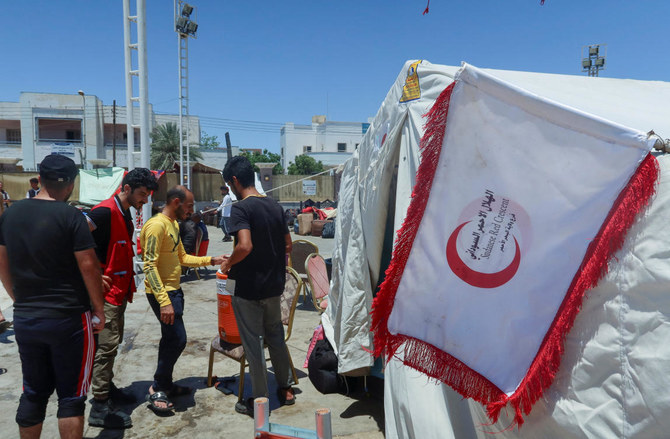
- In central areas of Khartoum, sporadic explosions could be heard Thursday, a day after the United Nations warned that the Sudanese people are “facing a humanitarian catastrophe”
- “The situation is very dire,” said Atiya Abdalla Atiya, who leads a key doctors union
Israel says more troops to ‘enter Rafah’ as operations intensify

The operation in Rafah “will continue as additional forces will enter” the area, Gallant said, adding that “several tunnels in the area have been destroyed by our troops... this activity will intensify.”
“Hundreds of [terror] targets have already been struck, and our forces are manoeuvring in the area,” he said in a ministry statement.
Tunisia blasts foreign criticism of arrests as ‘interference’

- Several prominent Tunisian pundits, journalists, lawyers and civil society figures have been arrested in recent days
- Late Saturday, masked police raided the Tunisian bar association headquarters and forcibly arrested lawyer Sonia Dahmani
TUNIS: Tunisian President Kais Saied on Thursday denounced foreign “interference” following international criticism of a recent flurry of arrests of political commentators, lawyers and journalists in the North African country.
Saied, who in 2021 orchestrated a sweeping power grab, ordered the foreign ministry to summon diplomats and “inform them that Tunisia is an independent state.”
Speaking during a televised meeting, the president told Mounir Ben Rjiba, state secretary to the foreign ministry, to “summon as soon as possible the ambassadors of a number of countries,” without specifying which ones.
Ben Rjiba was asked to “strongly object to them that what they are doing is a blatant interference in our internal affairs.”
“Inform them that Tunisia is an independent state that adheres to its sovereignty,” Saied added.
“We didn’t interfere in their affairs when they arrested protesters... who denounced the war of genocide against the Palestinian people,” he added, referring to demonstrations on university campuses in the United States and elsewhere over the Israel-Hamas war.
Several prominent Tunisian pundits, journalists, lawyers and civil society figures have been arrested in recent days, many of whom over a decree that punishes “spreading false information” with up to five years in prison.
Since Decree 54 came into force with Saied’s ratification in 2022, more than 60 journalists, lawyers and opposition figures have been prosecuted under it, according to the National Union of Tunisian Journalists.
Late Saturday, masked police raided the Tunisian bar association headquarters and forcibly arrested lawyer Sonia Dahmani over critical comments she had made on television.
On Monday police entered the bar association again and arrested Mehdi Zagrouba, another lawyer, following a physical altercation with officers. Zagrouba was subsequently hospitalized.
The arrests have sparked Western condemnation.
The European Union on Tuesday expressed concern that Tunisian authorities were cracking down on dissenting voices.
France denounced “arrests, in particular of journalists and members of (non-governmental) associations,” while the United States said they were “in contradiction” with “the universal rights explicitly guaranteed by the Tunisian Constitution.”
The media union said Wednesday that Decree 54 was “a deliberate attack on the essence of press freedom and a vain attempt to intimidate journalists and media employees and sabotage public debate.”
NGOs have decried a rollback of freedoms in Tunisia since Saied — who was elected democratically in October 2019 with a five-year mandate — began ruling by decree following the July 2021 power grab.
Egypt rejects Israeli plans for Rafah crossing, sources say

- An Israeli official said a delegation traveled to Egypt amid rising tension between the two countries
CAIRO: Egypt has rejected an Israeli proposal for the two countries to coordinate to re-open the Rafah crossing between Egypt’s Sinai Peninsula and the Gaza Strip, and to manage its future operation, two Egyptian security sources said.
Officials from Israeli security service Shin Bet presented the plan on a visit to Cairo on Wednesday, amid rising tension between the two countries following Israel’s military advance last week into Rafah, where hundreds of thousands of Palestinians displaced by war have been sheltering.
The Rafah crossing has been a main conduit for humanitarian aid entering Gaza, and an exit point for medical evacuees from the territory, where a humanitarian crisis has deepened and some people are at risk of famine. Israel took operational control of the crossing and has said it will not compromise on preventing Hamas having any future role there.
The Israeli proposal included a mechanism for how to manage the crossing after an Israeli withdrawal, the security sources said. Egypt insists the crossing should be managed only by Palestinian authorities, they added.
An Israeli official who requested anonymity said the delegation traveled to Egypt “mainly to discuss matters around Rafah, given recent developments,” but declined to elaborate.
Egypt’s foreign press office did not immediately respond to a request for comment.
Egypt and Israel have a long-standing peace treaty and security cooperation, but the relationship has come under strain during the Gaza war, especially since the Israeli advance around Rafah.
The two countries traded blame this week for the border crossing closure and resulting blockage of humanitarian relief.
Egypt says Rafah’s closure is due solely to the Israeli military operation. It has warned repeatedly that Israel’s offensive aims to empty out Gaza by pushing Palestinians into Egypt.
Israeli government spokesperson David Mencer said on Wednesday that Egypt had rejected an Israeli request to open Rafah to Gazan civilians who wish to flee.
The Israeli delegation also discussed stalled negotiations for a ceasefire and hostage release in Gaza during their Cairo visit, but did not convey any new messages, the Egyptian sources said. Egypt has been a mediator in the talks, along with Qatar and the United States.
Israel’s Gaza offensive has killed more than 35,000 Palestinians, according to Gaza health officials, with at least 82 killed on Tuesday in the highest single-day toll for weeks.
Hamas-led gunmen killed some 1,200 people and abducted 253 in their Oct. 7 raid into Israel, according to Israeli tallies.
Bahrain king calls for international Mideast peace conference

- Saudi Arabia’s Crown Prince Mohammed bin Salman called for the establishment of an internationally recognized Palestinian state
- It is the first time the Arab leaders have come together after Riyadh hosted an extraordinary summit in November where the bloc condemned Israel’s “barbaric” actions in Gaza
- Palestinian leader Mahmoud Abbas says Hamas gave Israel ‘pretexts’ to attack Gaza
MANAMA: The King of Bahrain, Hamad bin Isa Al Khalifa, called for an international conference for peace in the Middle East at the opening of the Arab League Summit in Manama.
The king, and the summit’s host, reaffirmed his country’s support for the full recognition of a Palestinian state and the acceptance of its membership in the United Nations.
He stressed that the establishment of a Palestinian state will reflect positively on the region.
Last week, the UN General Assembly overwhelmingly backed a Palestinian bid to become a full UN member and called on the UN Security Council to reconsider the request.
The vote by the 193-member General Assembly was a global survey of support for the Palestinian bid to become a full UN member - a move that would effectively recognize a Palestinian state - after the US vetoed it in the UN Security Council last month.
“What the Palestinians are facing requires a unified international stance,” the King of Bahrain said.
During his opening remarks at the summit, Saudi Arabia’s Crown Prince Mohammed bin Salman called for the establishment of an internationally recognized Palestinian state.
The prince was among the Arab delegates who arrived in Manama on Thursday for the Arab League Summit.
#PHOTOS: #SaudiArabia's Crown Prince Mohammed bin Salman arrives in #Manama for 2024 #Arab League summit https://t.co/zq5WR48Ig9 pic.twitter.com/IrbZKdQ5rS
— Arab News (@arabnews) May 16, 2024
During his speech, the prince highlighted the Kingdom’s efforts in alleviating the humanitarian crisis in Gaza, reiterating Saudi Arabia’s support for issues of the Arab world.
He urged the international community to back ceasefire efforts and halt the aggression on Palestinian civilians.
It is the first time the Arab leaders come together after Riyadh hosted an extraordinary summit in November where the bloc condemned Israel’s “barbaric” actions in Gaza.
The one-day summit was set to discuss events in Gaza, propose a ceasefire and push for a Palestinian state.
“The Kingdom calls for conflict resolution through peaceful means,” the prince said.
Palestinian leader slams Hamas
The Palestinian president Mahmoud Abbas criticized Hamas for giving Israel the ‘pretext to attack’ Gaza with the Oct. 7 attack.
“Hamas’ rejection of ending the division serves Israel’s interest in ending the two-state solution,” he noted, pointing to the long-standing tensions between the Palestinian Authority and the militant group governing Gaza.
He said the Palestinian government has not received the financial support it had expected from international and regional partners, noting that Israel is still withholding the funds and creating a dire situation.
the Palestinian leader called on Arab countries for financial support and the US to pressure Israel into releasing the funds.
“It has now become critical to activate the Arab safety net, to boost the resilience of our people and to enable the government to carry out its duties,” Abbas added.
He also urged the international community to start immediately with the implementation of the two-state solution and reiterated ‘full rejection’ of the displacement of Palestinians, who just marked the 76th anniversary of the 1948 Nakba.
Qatar’s Emir Tamim bin Hamad Al Thani, UAE’s Vice President and Prime Minister Mohammed bin Rashid, Kuwait’s Prime Minister Sheikh Ahmad Abdullah Al-Ahmad Al-Sabah, and Syria’s President Bashar Al Assad were among the attendees on Thursday.
Lebanon media says Israel struck Hezbollah eastern stronghold overnight

- Israel and Hamas ally Hezbollah have exchanged near-daily fire following the Palestinian group’s October 7 attack on southern Israel that sparked the war in Gaza
Beirut: Lebanese state-run media reported Thursday an overnight Israeli air raid on eastern Lebanon, where Hezbollah holds sway, hours after the Iran-backed armed group launched an attack deep into Israeli territory.
Israel and Hamas ally Hezbollah have exchanged near-daily fire following the Palestinian group’s October 7 attack on southern Israel that sparked the war in Gaza, now in its eighth month.
Lebanon’s official National News Agency said that “the outskirts of the eastern Lebanon mountain range, at midnight (2100 GMT Wednesday), was subjected to five enemy raids.”
The strikes in the Baalbek area “slightly injured a citizen” and caused fires, the report added.
A source close to Hezbollah told AFP that one of the strikes “hit a Hezbollah military camp.”
An Israeli army spokesman told AFP: “I can confirm that an airstrike was indeed conducted deep in Lebanon against a terror target related to Hezbollah’s precision missile project.”
The area of Baalbek in the Bekaa valley is a Hezbollah bastion, bordering Syria.
Hezbollah launchrocket barrage at Israeli positions
Lebanon’s Iran-backed Hezbollah group said it launched on Thursday “more than 60” rockets at Israeli military positions in retaliation for overnight air strikes.
Hezbollah fighters “launched a missile attack with more than 60 Katyusha rockets” on several Israeli military positions including in the Israeli-annexed Golan Heights, the group said in a statement, adding it was “in response to the Israeli enemy’s attacks last night on the Bekaa region” in Lebanon’s east.
The cross-border fighting has killed at least 413 people in Lebanon, mostly militants but also including dozens of civilians, according to an AFP tally.
Israel says 14 soldiers and 10 civilians have been killed on its side of the border.
Tens of thousands of people have been displaced in areas on both sides of the border.



